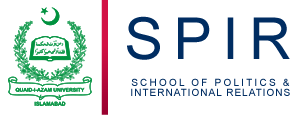The School of Politics and International Relations organized an online seminar by Dr. Mustafa Izzuddin, Senior Analyst in International Affairs at Solaris Strategies, Singapore on Envisioning the Potential in Pakistan-South East Asia Relations.
The main theme of Dr. Izzuddin’s talk revolved around potential gains and relevant lessons that Pakistan could learn from Southeast Asia and vice versa. Dr. Izzuddin proffered a historical overview reiterating transnational interactions between Southeast Asia and the Indian subcontinent during the colonial period including the presence of the Pakistani diaspora in Singapore and other states in the region. However, he lamented that post-colonial interactions have proved less effective with Pakistan looking more towards the Western world as opposed to Southeast Asia. A major initiative undertaken by Pakistan to reorient its foreign policy towards the Southeast Asian region came with the enunciation of the Vision East Initiative 2003 and Prime Minister Imran Khan’s recent moves towards the region, specially Malaysia. In order to make recent moves more meaningful, Dr. Izzuddin suggested that Pakistan enhance not only its political and economic engagement but also open the doors to cultural and tourism diplomacy. The ASEAN forum also provides a viable platform and Pakistan should work towards becoming a Dialogue Partner within the regional organisation. Dr. Mustafa also threw light on joint military exercises which have been and can be conducted between Pakistan and the regional states going into the future. In this, he pointed out that the region can be a good market for Pakistan to export its armaments. Dr. Izzuddin also shed light on the China factor in Pakistan’s relationship with the regional states reiterating that Southeast Asian nations would want Pakistan to take a more neutral position in the South China Sea. In conclusion, the speaker stressed the need for a policy perspective from the Foreign Office in Pakistan—wherein positive engagement needs to be instilled on bilateral and multilateral levels by tapping into not just political and economic, but cultural, social, religious and strategic facets as well.
In his opening remarks, Dr. Farhan Hanif Siddiqi, Director SPIR laid emphasis on the outstanding economic growth achieved by the Southeast Asian nations in a short span of 50 years. He said that we need to learn the right lessons and engage in a thorough and substantive research on the political, economic and social mores of the region understanding not only exponential economic growth but also Southeast Asian states’ proclivity towards effective governance and efficient service delivery. Dr. Izzuddin’s talk was followed by an engaging question and answer session. Dr. Farhan Siddiqi thanked Dr. Mustafa Izzuddin for reaching out to the School and engaging in a wholesome talk on the Southeast Asian region.

